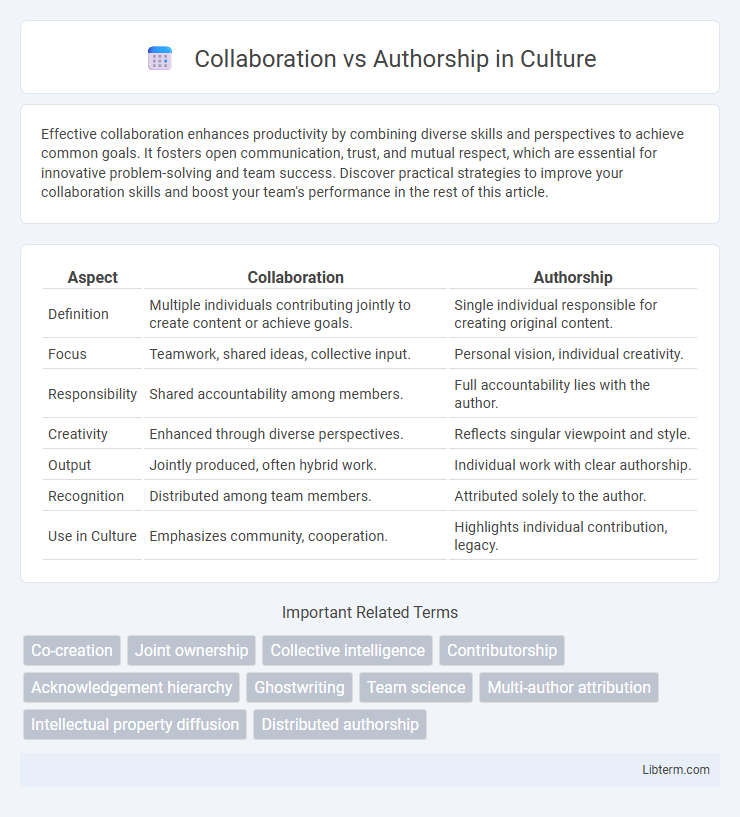Effective collaboration enhances productivity by combining diverse skills and perspectives to achieve common goals. It fosters open communication, trust, and mutual respect, which are essential for innovative problem-solving and team success. Discover practical strategies to improve your collaboration skills and boost your team's performance in the rest of this article.
Table of Comparison
| Aspect | Collaboration | Authorship |
|---|---|---|
| Definition | Multiple individuals contributing jointly to create content or achieve goals. | Single individual responsible for creating original content. |
| Focus | Teamwork, shared ideas, collective input. | Personal vision, individual creativity. |
| Responsibility | Shared accountability among members. | Full accountability lies with the author. |
| Creativity | Enhanced through diverse perspectives. | Reflects singular viewpoint and style. |
| Output | Jointly produced, often hybrid work. | Individual work with clear authorship. |
| Recognition | Distributed among team members. | Attributed solely to the author. |
| Use in Culture | Emphasizes community, cooperation. | Highlights individual contribution, legacy. |
Understanding Collaboration and Authorship
Collaboration involves multiple contributors working together to create or develop content, sharing ideas, resources, and responsibilities to achieve a common goal. Authorship specifically denotes the individual or group credited with the intellectual contribution and original creation of a work, often holding legal rights and accountability. Understanding the distinct roles and contributions in collaboration clarifies the criteria for authorship recognition and ethical attribution in academic and professional contexts.
Key Differences Between Collaboration and Authorship
Collaboration involves multiple contributors working jointly to create or produce content, emphasizing shared ideas and responsibilities, while authorship assigns credit to individuals primarily responsible for original work or intellectual property. In collaboration, contributions may vary in scope and influence, whereas authorship requires meeting specific criteria like substantial intellectual input and accountability for the final product. Understanding these distinctions ensures clarity in attribution, intellectual property rights, and ethical considerations in academic and professional contexts.
The Evolution of Creative Partnerships
Creative partnerships evolved from traditional single-author works to dynamic collaborations, blending diverse skills and perspectives. The rise of digital platforms and remote communication tools accelerated this shift, enabling seamless co-creation across global teams. Collaborative projects often generate richer, more innovative outputs, reflecting the interplay of multiple creative minds rather than individual authorship.
Roles and Responsibilities in Collaborative Projects
Collaboration in projects emphasizes shared roles and responsibilities where team members contribute diverse expertise toward a common goal, ensuring transparent communication and mutual accountability. Authorship, in contrast, assigns credit based on individual intellectual contributions, highlighting responsibility for specific content or research outcomes. Clear delineation of tasks and recognition criteria is crucial in collaborative projects to maintain fairness and uphold ethical standards.
Defining Authorship: Criteria and Challenges
Defining authorship in academic and professional contexts involves meeting specific criteria such as substantial contributions to the conception, design, execution, or interpretation of research. Challenges arise from varying disciplinary standards, ambiguous contributions, and disputes over intellectual ownership, which complicate the attribution of credit and responsibility. Clear guidelines from institutions and journals aim to address these complexities by promoting transparency and accountability in collaborative work.
Benefits of Collaboration in Creative Works
Collaboration in creative works amplifies diverse perspectives and skill sets, enhancing innovation and originality. Shared expertise accelerates problem-solving and improves the quality of the final output, leading to more impactful and well-rounded projects. Effective collaboration fosters a dynamic exchange of ideas, expanding creative boundaries beyond what individual authorship can achieve.
Potential Conflicts in Collaboration and Authorship
Potential conflicts in collaboration and authorship often arise due to unclear contribution boundaries and miscommunication regarding credit allocation. Disputes may involve disagreements about the order of authors, recognition of intellectual input, or unequal workload distribution, potentially undermining team cohesion. Establishing transparent agreements and ongoing dialogue is essential to mitigate conflicts and ensure fair attribution in collaborative projects.
Ethical Considerations and Credit Allocation
Ethical considerations in collaboration versus authorship revolve around transparent contribution disclosure and fair credit allocation to prevent disputes and ensure academic integrity. Properly distinguishing between substantial intellectual input qualifying for authorship and supportive roles warranting acknowledgment is critical for upholding ethical standards. Implementing clear guidelines such as the ICMJE criteria fosters equitable attribution and maintains trust within research communities.
Best Practices for Successful Collaboration
Successful collaboration requires clear communication, defined roles, and mutual respect among all contributors to avoid conflicts related to authorship. Establishing authorship criteria and agreements early in the project ensures transparency and proper credit for individual contributions. Regular project updates and documented contributions facilitate accountability and maintain trust throughout the collaborative process.
Future Trends in Collaboration and Authorship
Emerging technologies like blockchain and AI are set to revolutionize collaboration and authorship by enhancing transparency and intellectual property management across multiple contributors. Decentralized platforms will enable real-time co-creation and verifiable attribution, reshaping how creators share credit and monetize their work. Future trends emphasize increased integration of collaborative tools with automated authorship tracking to support fair recognition in the digital content economy.
Collaboration Infographic

 libterm.com
libterm.com